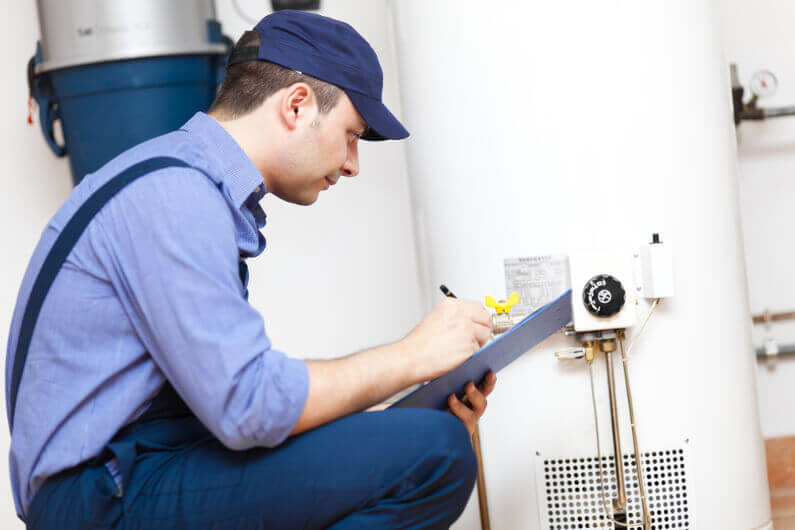Indicators Your Water Heater Needs to be Restored or Replaced
Indicators Your Water Heater Needs to be Restored or Replaced
Blog Article
Right here below you'll find some good points in relation to Is Your Water Heater About to Die?.

Often, the lag in your heater is simply a result of showering too much or doing lots of washing. However, there are circumstances when your devices needs dealing with so you can proceed delighting in warm water. Don't await damaged water heaters to offer you a big frustration at the top of winter.
Rather, learn the warning signs that show your water heater gets on its last leg before it entirely conks out. When you see these six warnings, call your plumber to do repair services before your device entirely fails as well as leakages all over.
Experiencing Variations in Temperature Level
Your water heating unit has a thermostat, as well as the water created must stay around that exact same temperature you set for the system. If your water ends up being as well hot or as well cold all of a sudden, it could indicate that your water heating unit thermostat is no longer doing its task.
Producing Insufficient Hot Water
If there is not enough hot water for you as well as your family, yet you haven't changed your intake behaviors, then that's the indicator that your hot water heater is stopping working. Typically, growing families and an added washroom suggest that you have to scale up to a larger device to fulfill your needs.
Nonetheless, when every little thing coincides, however your water heater suddenly does not meet your warm water requirements, think about a professional inspection due to the fact that your maker is not carrying out to standard.
Seeing Leakages and Pools
Check to ports, screws, and pipelines when you see a water leak. You may simply need to tighten up a few of them. However, if you see pools gathered at the end of the heating system, you must ask for an immediate examination since it shows you've obtained an active leakage that could be an issue with your container itself or the pipes.
Listening To Weird Seems
When uncommon sounds like knocking as well as touching on your machine, this suggests debris build-up. It is akin to stratified rocks, which are tough and make a lot of sound when banging versus metal. If left unattended, these items can develop tears on the metal, creating leaks.
You can still save your water heater by draining it and also cleansing it. Simply be careful since dealing with this is unsafe, whether it is a gas or electrical device.
Noticing Stinky or cloudy Water
Does your water suddenly stink like rotten eggs and look filthy? If you scent something unusual, your water heating system can be acting up.
Aging Past Requirement Life Expectancy
If your water heater is more than ten years old, you should think about replacing it. That's the natural lifespan of this machine! With proper upkeep, you can expand it for a couple of even more years. On the other hand, without a routine tune-up, the life expectancy can be much shorter. You might think about water heater replacement if you know your water heater is old, combined with the other issues mentioned over.
Do not wait for broken water heaters to provide you a big frustration at the height of wintertime.
Your water heater has a thermostat, and the water generated need to stay around that same temperature level you establish for the unit. If your water comes to be as well cold or also hot all of a sudden, it can imply that your water heater thermostat is no much longer doing its job. If your water heating system is even more than 10 years old, you should consider changing it. You may take into consideration water heating unit substitute if you know your water heating system is old, combined with the various other problems discussed over.
Recognizing the Signs of a Damaged Water Heater
Winter may be mostly behind us but having hot water in our homes is a necessity year-round. A broken water heater can be a time-consuming and costly problem.
Recognizing the signs of a water heater in distress, and knowing what to do about it, is the best way to avoid a full-blown water heater "meltdown."
Sediment buildup, rust, and high water pressure are some of the most common causes of water heater failure. Improper installation or equipment sizing are other commonly found issues. A leak can occur near the supply line which can cause damage to dry wall or flooring.
Like any appliance, frequent checks can prevent your water heater from becoming a big problem. Try to set an annual reminder to check for water pooling around your water heater and to tighten any loose fittings you might find. The quicker the issue is resolved, the less damage it will cause in the end.
If you do find signs that your water heater is broken or about to burst, the first thing to do is to shut it off. For gas water heaters, twist the dial at the top of the thermostat from ON to OFF. If it’s an electric heater, switch the circuit breaker to OFF.
Once the water heater is turned off follow these steps:
Turn off the water supply. Completely drain the water heater. Open the pressure relief valve. Rinse the water heater with cold water when the unit has finished draining. https://armstrongcomfort.com/Blog/things-that-can-cause-your-water-heater-to-break

As an avid person who reads about Is Your Water Heater About to Die?, I imagined sharing that short article was a smart idea. Make sure you set aside a second to share this page if you enjoyed reading it. I enjoy reading our article about Telltale Signs That It’s Time for a New Hot Water Heater.
Find Out More
Report this page